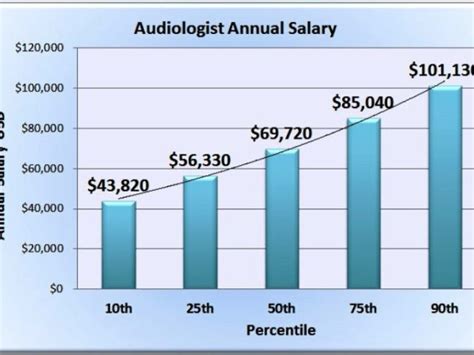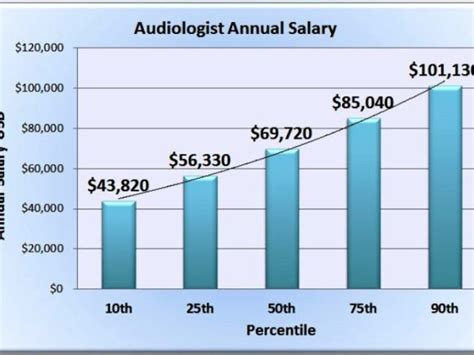A career as a Doctor of Audiology (Au.D.) is a powerful blend of healthcare, technology, and human connection. For those drawn to the science of hearing and the reward of helping others communicate, it's a compelling path. But beyond personal fulfillment, what is the financial outlook for this profession?
The great news is that a career in audiology is not only rewarding but also financially stable. The median salary for audiologists in the United States is approximately $87,740 per year, with top earners in high-demand settings reaching well over $130,000 annually.
This guide will break down the salary you can expect as a Doctor of Audiology, the key factors that influence your earnings, and the strong job outlook for this vital healthcare profession.
What Does a Doctor of Audiology Do?

Before diving into the numbers, it's essential to understand the role. A Doctor of Audiology is a licensed healthcare professional who specializes in diagnosing, treating, and managing hearing loss, tinnitus, and balance disorders. They are the primary experts in hearing health.
Key responsibilities include:
- Diagnosing hearing and balance problems using a variety of tests and equipment.
- Fitting and dispensing hearing aids, cochlear implants, and other assistive listening devices.
- Developing and implementing rehabilitation programs for patients with hearing loss.
- Providing patient and family counseling on the effects of hearing loss.
- Preventing hearing loss through public awareness programs and fitting custom hearing protection.
- Conducting research on new treatments and technologies.
The entry-level degree for clinical practice is the Doctor of Audiology (Au.D.), a four-year post-bachelor's graduate degree that provides comprehensive training in all aspects of the field.
Average Doctor of Audiology Salary

Salary data shows a healthy and competitive range for audiologists. While figures can vary slightly between sources due to different data collection methods, they all point to a strong earning potential.
- The U.S. Bureau of Labor Statistics (BLS) reports a median annual wage for audiologists of $87,740 as of May 2023. The lowest 10 percent earned less than $63,630, while the top 10 percent earned more than $132,710.
- Salary.com reports a slightly higher median salary of $94,034, with a typical range falling between $85,631 and $103,692.
- Payscale data indicates an average base salary of around $78,416, highlighting how factors like bonuses and profit-sharing can influence total compensation.
This range illustrates that while the median provides a solid benchmark, your individual earnings as an audiologist will be shaped by several critical factors.
Key Factors That Influence Salary

Your specific salary is not a single number but a dynamic figure influenced by your choices, skills, and environment. Here are the most significant factors that will impact your earning potential.
### Level of Education and Certification
The Doctor of Audiology (Au.D.) is the standard for clinical practice and the foundation for your salary. However, pursuing further credentials can open doors to higher-paying roles. While not mandatory for most clinical jobs, a Ph.D. in audiology is geared toward research and academia, and faculty or research scientist positions can have different, often higher, salary scales. Additionally, voluntary professional certifications, such as the Certificate of Clinical Competence in Audiology (CCC-A) from the American Speech-Language-Hearing Association (ASHA), signal a high level of expertise and are often required by employers, potentially leading to better job offers.
### Years of Experience
As with most professions, experience is a major driver of salary growth. As you build your clinical skills, reputation, and patient base, your value to an employer—or your own practice—increases significantly.
- Entry-Level (0-2 years): New graduates can typically expect to earn a salary in the lower end of the range, from $70,000 to $80,000, as they gain hands-on experience.
- Mid-Career (5-9 years): With several years of experience, audiologists see a substantial salary increase, often earning between $85,000 and $100,000. They may take on more complex cases or supervisory roles.
- Senior/Experienced (10+ years): Highly experienced audiologists, especially those in management, specialization, or private practice, can command the highest salaries, often exceeding $110,000 to $130,000+.
### Geographic Location
Where you practice has a significant impact on your salary due to varying demand and costs of living. According to the BLS, the top-paying states for audiologists include:
- California: $120,490 (average annual wage)
- Maryland: $109,240
- District of Columbia: $105,380
- New York: $102,020
- New Jersey: $100,290
Conversely, states with a lower cost of living or less demand may offer salaries closer to the lower end of the national range. It's always wise to research the specific salary landscape in the state and city where you plan to work.
### Company Type / Work Setting
The environment where an audiologist works is one of the most significant determinants of salary. The ASHA 2023 Au.D. Salary Report provides excellent insight into this.
- Private Practice: Audiologists who own or are partners in a private practice have the highest earning potential, as their income is tied to the business's profitability, including hearing aid sales. It's not uncommon for practice owners to earn well into the six figures.
- Offices of Physicians (ENTs): Working in an Ear, Nose, and Throat (ENT) physician's office is a high-paying setting. These audiologists work closely with physicians on complex diagnostic cases and often have a median salary above $95,000.
- Hospitals (State, Local, and Private): Hospitals offer competitive salaries and excellent benefits. The median salary for hospital-based audiologists is typically strong, often in the $90,000 to $100,000 range, according to ASHA data.
- Educational Services (Schools & Universities): Audiologists working in K-12 school systems or universities tend to have salaries on the lower end of the scale. However, these positions often come with excellent benefits, pension plans, and work schedules that align with the academic year.
### Area of Specialization
While general audiology is the norm, developing a niche can increase your marketability and salary. Highly technical or in-demand specializations can command higher pay.
- Cochlear Implants: This is a highly specialized and technical field that often requires additional training and certification, leading to higher compensation.
- Vestibular/Balance Disorders: Expertise in diagnosing and treating dizziness and balance issues is a valuable skill that can lead to roles in specialized balance centers with higher pay.
- Pediatric Audiology: Working with infants and children requires a unique skill set and can be a lucrative specialization, particularly in dedicated children's hospitals or clinics.
Job Outlook

The future for Doctors of Audiology is exceptionally bright. The BLS projects that employment for audiologists will grow by 10% from 2023 to 2033, which is much faster than the average for all occupations.
This robust growth is driven by several factors:
- An Aging Population: The large baby-boom generation is entering an age where hearing loss becomes more prevalent, increasing demand for diagnostic services and hearing aids.
- Early Identification: Improved newborn screening programs mean hearing loss is being identified at birth, creating a need for pediatric audiological services.
- Technological Advances: New and improved hearing aid technologies and cochlear implants are making treatment more effective and desirable.
Conclusion

Choosing a career as a Doctor of Audiology is a decision to pursue a path that is both professionally meaningful and financially secure. With a strong median salary and a job market projected to grow significantly faster than average, the profession offers excellent stability and opportunity.
While the national average salary provides a great starting point, remember that your earning potential is in your hands. By gaining experience, considering high-demand locations and work settings, and potentially developing a valuable specialization, you can build a highly successful and lucrative career dedicated to improving the quality of life for others. For those passionate about science and service, audiology is a sound investment in your future.
